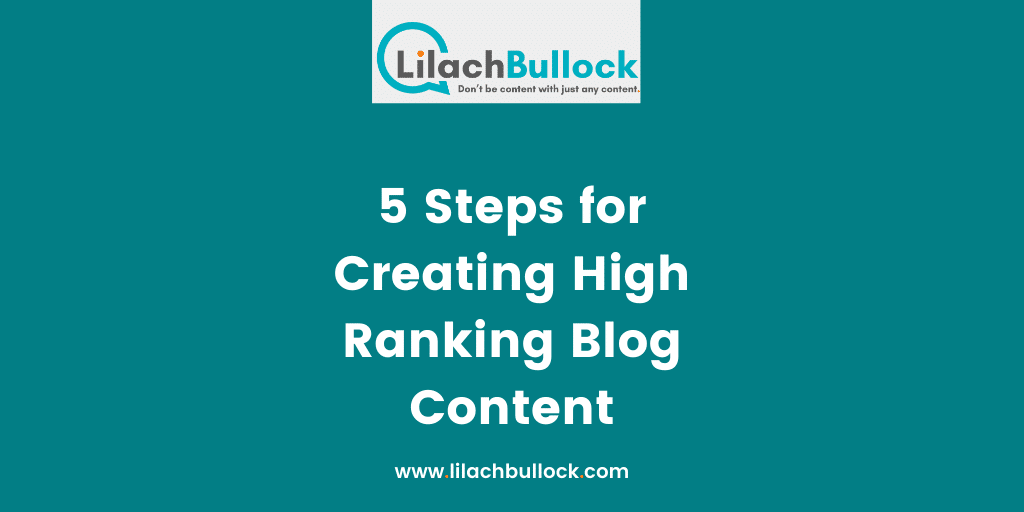Follow Lilach

5 Steps for Creating High Ranking Blog Content
People that own websites would love to master the art of creating content for Google that ranks higher than their competitors because that would allow their brand, product, service and/or website to get more exposure. After all, who wouldn’t want to have a flood of traffic coming to their website from blog content that may have been written months (and in some cases years) prior?

Before we go into detail on how to make this happen, let’s be realistic. Not all content is created equal, so some of your content just won’t rank high in Google no matter what you do with it. It doesn’t mean the material has no value; it just reflects the ever-evolving culture of blogging, SEO and increasing competition. Hopefully, the tips provided in this article will give you the edge you need to gain an advantage in the search engines when publishing your blog content.
Let’s get right into it!
1. Target the Right Keywords
The art of creating high ranking blog content starts with knowing how to use the right keywords. If you use broad or commonly used keyword phrases, then your content has a chance of becoming lost among competitors that use the same phrases. Broad keywords are almost always oversaturated because a lot of other websites go after these same exact terms.
To prevent low search engine rankings from using highly competitive keyword phrases, try keyword resources like Ahrefs, Keywordtool.io, Keywords Everywhere and Ubersuggest to generate more specific and longer-tail keyword phrases (with 3 or more words in them). These longer tail keyword phrases will increase your chances of ranking higher in Google and can generate more organic website traffic.
For example, if you are a personal trainer, you could use a longer keyword phrase like “how to find a personal trainer near me” instead of using the broader and more competitive term such as “personal trainer.” Also, consider metrics such as “search volume” and “keyword difficulty” when researching your keywords to gain an idea of how competitive that phrase may be and to gauge how many people are using that keyword phrase when searching on the internet. This will help you weed out keywords that aren’t worth targeting for your blog content posts.
2. Create Longer-Form Style Content
After selecting your targeted keywords, focus on making sure your content is at least 1,500 or more words because Google loves having detailed content on the first page of search results. Articles that contain vague information don’t rank all that well on Google. The reason being because content that contains detailed information (and helps people solve their problems) tends to have more value in the eyes of the Google algorithm. We must remember that Google desires to provide users with relevant and meaningful content, so they will prefer material that provides more than the minimum in terms of quality when it comes to content.
A blog post that covers a subject in its entirety and provides answers to questions really can rank well in the search results. Long gone are the days where you can just throw up a “thin” post and expect it to rank well. Focus on creating long-form and helpful content for your readers for the best results and also retention rate.
3. Content & SEO Tag Optimization
Your content is optimized properly when you make sure your keyword phrases are included within your article, where appropriate and without keyword stuffing. Also, you want to make sure you include links to relevant information on your website.
The goal is to make sure your internal links and keywords flow naturally in your writing. Therefore, don’t try to shove them into places in your content where they don’t logically belong. You will also want to make sure your SEO tags (i.e., title tags, meta descriptions, image ALT tags, and header tags) are optimized effectively, so try using a WordPress plugin like Yoast to assist you with making this happen. Your tags should be written naturally as well with your main keywords in place. The tags that are seen in a Google search result are your title tags and meta descriptions, so it’s important that you also write these with the human visitor in mind as well. Make sure to include your targeted keywords within your tags (and variations of those keywords) to give your blog content the best possible chance of ranking in Google.

4. Add Article Schema Markup
Schema markup is a specific code that you would implement on your website which helps Google better understand what a given page or post is about. If your website is built on WordPress, there are various plugins to make this process as simple as possible. Using the “article” schema markup for all your blog posts, can really make a difference and help your content rank higher in Google’s search results. Schema markup can also aid in acquiring featured snippet type results, which can be a great method to drive more targeted traffic to your website. Keep in mind that you can use schema markup for other things besides articles (for example, there’s FAQ, Organization, Q&A, Product, etc.). So make sure to decide which type of schema markup is suitable for your business.
5. Build Backlinks to Your Article

As a blogger, you want to have other authoritative links pointing to your website to show Google that you ar
e actually worthy of ranking in their SERPs. Guest posting is one of the best ways to build backlinks to your content and website in general. Do some niche research to find websites that would be suitable for guest posting because they often allow you to include a link to your homepage within your guest post. Also, work in link building campaigns that focus on specific content that you desire to have a higher ranking in Google’s search results. You want to build links to specific blog posts as well and not just your homepage. These strategies will help you and your website eventually become an authority in your niche on Google.
6. Consistency and Repetition
Lastly, you must be consistent in all the steps laid about above. As a blogger, you need to be publishing fresh, unique and high-quality content on a regular basis. You also need to optimize your posts properly and target specific keywords as discussed above. The more you do this, the better you will get at identifying achievable keywords and actually rank for them. Being disciplined in your content generation and SEO optimization tactics could really make a big impact on the type of traffic your website generates. Every blog is different but strives to publish at the very least 2-4 posts per month for the best results.
Conclusion
If you take the advice given here, you will be well on your way to generating content that will have higher rankings in Google’s search results. While you are working through this process, make sure you keep track of what you did to get there so you can have a blueprint to follow when it comes to writing/optimizing the next article. And above all else, have patience. Success rarely happens overnight and especially with ranking blog content, so expect this process to take some time. However, if you follow the suggestions mentioned in this article, it will be worth your while because you should see a drastic increase in your search engine rankings, and become an authority figure within your niche.
About the author:

Since 2007, Internet Marketer and blogger Evan Hoeflich has been mastering the art of generating meaningful content and optimizing it for SEO. And now through his website, Evan is able to share his love for coaching by helping fellow bloggers and entrepreneurs get training on proven strategies that will increase their organic search presence in Google and other major search engines.

Follow Lilach















